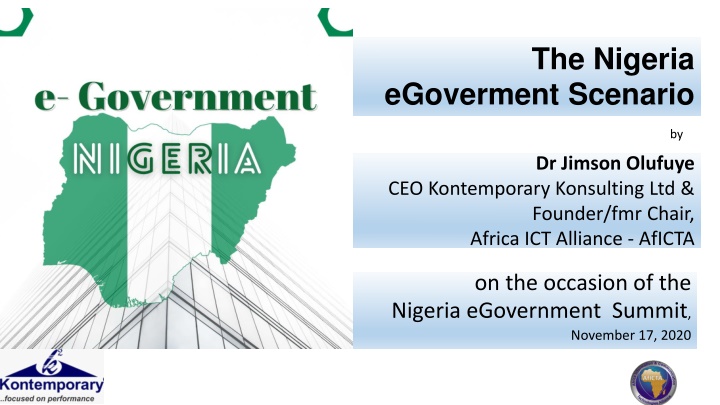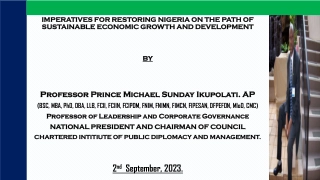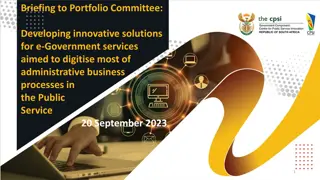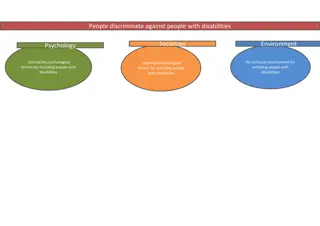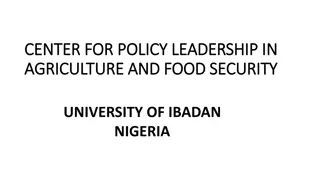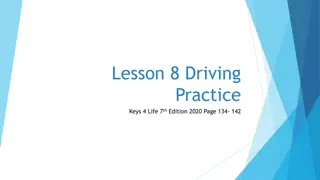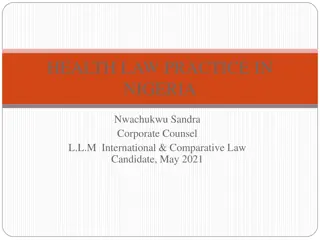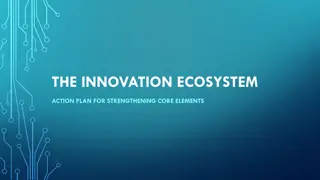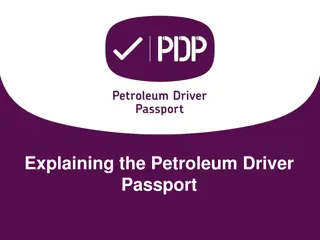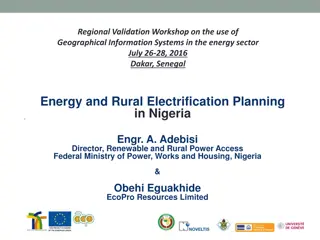Nigeria eGovernment Scenario & Institutional Drivers
Journey through Nigeria's eGovernment landscape, highlighting key policies, laws, and institutional drivers shaping the digital economy. Explore outcomes, drawbacks, infrastructure, and advancements in online applications.
Download Presentation

Please find below an Image/Link to download the presentation.
The content on the website is provided AS IS for your information and personal use only. It may not be sold, licensed, or shared on other websites without obtaining consent from the author.If you encounter any issues during the download, it is possible that the publisher has removed the file from their server.
You are allowed to download the files provided on this website for personal or commercial use, subject to the condition that they are used lawfully. All files are the property of their respective owners.
The content on the website is provided AS IS for your information and personal use only. It may not be sold, licensed, or shared on other websites without obtaining consent from the author.
E N D
Presentation Transcript
The Nigeria eGoverment Scenario by Dr Jimson Olufuye CEO Kontemporary Konsulting Ltd & Founder/fmr Chair, Africa ICT Alliance - AfICTA on the occasion of the Nigeria eGovernment Summit, November 17, 2020
Talking Points Introduction - Journey thus far Comparative Digital Economy Trends Policy/Laws in place eGovernment Master Plan Outcomes Drawbacks Conclusion
Introduction: Journey thus far Stable democrary since 1999 Effect of Telecom (NCC) Policy 2000 & IT (NITDA) Policy in 2001 Telecom (NCC) Act 2003 & IT (NITDA) Acts of 2007 Freedom of Information Act, 2011
Institutional Drivers Federal Ministry of Communications and Digital Economy NCC: Nigerian Communications Commission (Telecom Regulations) NBC: National Broadcasting Corporation (Spectrum Management - TV White Space) NITDA: National IT Development Agency (IT Standards and Regulations) Government Access Providers: NIGCOMSAT, Galaxy Backbone
Institutional Drivers NBS: National Bureau of Statistics CBN: Central Bank of Nigeria NIMC: National Identity Management Commission - Digital identity
Where are we? Infrastructure International connectivity 340 GB with a single international submarine cable in 2001 9 Tbit/s by 2012 97.92Tbit/s by 2014 Delivery mostly by mobile broadband - 2.5G (GPRS), EDGE, UMTS, HSPA, HSPA+ and CDMA EV-DO, 3G, 4G/LTE Services 1Gov.NG services by Galaxy Backbone Plc connecting 4,000 locations & 350 MDAs
Where are we? Transformation of erstwhile Ministry of Communications to Ministry of Communications & Digital Economy. Designation of Telco infrastructure as Critical National Infrastructure meaning govt will provide security and prosecute any deliberate disruption of the telco facilities and operations. Right of Way fees reduction for Infracos Virtual meeting now standard in Federal Executive Council meetings Increasing Online Applications
Online Applications CBN: TSA - Treasury Single Account; OAGF: Office of the Accountant - General for the Federation, IPPIS: Integrated Payroll Payment Information System; GIFMIS: Government Integrated Financial Management Information System. www.gifmis.gov.ng FIRS: Federal Inland Revenue Service - eTax Clearance Certificate. www.firs.gov.ng OAuGF: Office of the Auditor-General for the Federation (AuditTracker, Afrrep- Audit Firm Registration and Renewal Portal). www.oaugf.ng
Online Applications BVN - Bank Verification Number JAMB - Online exams for Admission into Nigerian Universities CAC: Company Registration Portal NIM: Nigerian Immigration Service, ePassport, eVisa, ePermit NCS: Nigeria Customs Service, eServices Health and Welfare Mobile Drug Authentication, National Health Insurance Scheme (www.nhis.gov.ng) Driver's License(www.nigeriadriverslicence.org) Vehicle License(www.nvisng.org)
Online Applications Whole of Govt email system Nigeria Oil & Gas Industry: joint qualification system (portal.nogicjqs.com) National Identity Card (ninenrol.gov.ng) Open Data Socio-economic data(www.nigerianstat.gov.ng) NAFDAC Export Approval (National Agency for Food and Drugs Administration and Control: www.nafdac.gov.ng) AGIS: Abuja Geographic Information System. www.agis.fcta.gov.ng
Economic Verdict ICTs Contribute more than 17% to Nigeria's GDP of USD$446.5b (2019est)
Comparative Digital Economy Trends/Stats % Internet Penetration in the Top 20 Countries with Highest Internet Users 120 100 100 95 94 94 94 93 91 82 82 80 80 80 72 70 67 63 61 59 57 60 48 41 40 20 0
Comparative Digital Economy Trends/Stats Top20 Countries with Highest Internet Users in Africa 140,000,000 126,078,999 120,000,000 49,231,493 20,507,255 7,898,534 11,737,818 46,870,422 18,502,166 100,000,000 32,615,165 7,078,067 13,124,100 9,749,527 25,428,159 12,480,176 80,000,000 11,953,653 23,739,581 6,523,613 60,000,000 8,400,000 9,870,427 23,142,960 7,475,917 40,000,000 20,000,000 0
Digital Economy Trends/Stats Top20 Highest Internet Penetration in Africa 100.0 87.2 90.0 80.0 74.2 72.5 67.0 66.8 70.0 64.3 63.3 61.8 61.6 61.2 58.8 58.2 58.0 57.3 60.0 56.5 55.5 55.0 53.7 53.0 48.1 50.0 40.0 30.0 20.0 10.0 0.0
Current Policy Frameworks in place Nigeria Digital Economy Policy & Strategy for a Digital Nigeria, 2020-2030 launched on 17 October, 2019 by President M. Buhari VISION: To transform Nigeria into a leading digital economy providing quality life and digital economies for all. MISSION: We build a nation where digital innovation and entrepreneurship are used to create value and prosperity for all.
Current Policy Frameworks in place Nigeria Digital Economy Policy & Strategy for a Digital Nigeria, 2020- 2030 is based on 8 pillars namely: 1. Developmental Regulation; 2. Digital Literacy & Skills; 3. Solid Infrastructure; 4. Service Infrastructure; 5. Digital Services Development & Promotion;
Current Policy Frameworks in place 6. Soft Infrastructure; 7. Digital Society & Emerging Technologies; and 8. Indigenous Content Development & Adoption.
Current Policy/Law/EOs in place Nigeria Cybersecurity Policy & Strategy, 2020 The Cybercrime Acts, 2015 Executive Orders 003 and 005 on Ease of doing business to promote G2B, G2G, G2C.
Current NITDA Guidelines & Frameworks Guidelines for The Management of Personal Data by Public Institutions in Nigeria, 2020 Guidelines for Nigerian Content Development in Information and Communication Technology (ICT) Framework and Guidelines for Public Internet Access Guidelines for Clearance of Information Technology (IT) Project by Public Institutions Guidelines for Registration of ICT Service Providers/Contractors for Delivery of of IT Services to MDAs NIgerian Data Protection Regulation (NDPR)
NITDA Guidelines & Frameworks Nigeria e-Government Interoperability Framework (Ne-GIF) Framework and Guidelines for Information and Communication Technology Adoption in Tertiary Institutions Framework and Guidelines for the Use of Social Media Platforms in Public Institutions https://nitda.gov.ng/regulations/
Single Window Portal http://services.gov.ng
FMoCDE eGovt Master Plan 2019 The eGovernment Master Plan 2019 is to Utilize ICT to drive transparency in governance and improve the quality and cost effectiveness of public service delivery in Nigeria . Ministry of Communications & Digital Economy
FMoCDE eGovt Master Plan Vision to create a world class open and digitized government that connects with people to drive efficiency in public administration, responsiveness of civil services and transparency in governance leading to improvement of the quality of life of Nigerians. Ministry of Communications & Digital Economy
FMoCDE eGovt Master Plan Vision to create a world class open and digitized government that connects with people to drive efficiency in public administration, responsiveness of civil services and transparency in governance leading to improvement of the quality of life of Nigerians. Ministry of Communications & Digital Economy
Expected Outcomes The strategic outcomes from the proposed e-Government Masterplan is a High Performing Government with the following features: i. High Performance Culture:- Accountability for performance Citizen-centric government An integrated government ii. Right People:- Competent, committed, non-corruptible public officers Public Service as employer of choice
Expected Outcomes The strategic outcomes from the proposed e-Government Masterplan is a High Performing Government with the following features: iii. Responsible Financial Management- Fiscal Sustainability Effective and efficient use of financial resources
Expected Outcomes e-Government Master Plan Implementation Outcomes is mapped into improvement of the e- Government Development Index and the e-Participation Index. These are measurable impacts that will translate e-Governance from the emerging to the connected stage of development.
Ministry of Communications & Digital Economy
Drawbacks Near zero Govt led WSIS participation (both at the UN & Africa levels) No ePublic Procurement: lack of transparency and accountability, No Govt business Workflow - Document Management with workflow
Drawbacks Delivery to last mile (TV White Space to the rescue?) Need for more laws? Don't think so
Conclusion Effective eGovernment Implementation would go along way to unlock the Digital Potentials of Nigeria.
Thank you. jolufuye@kontemporary.net
